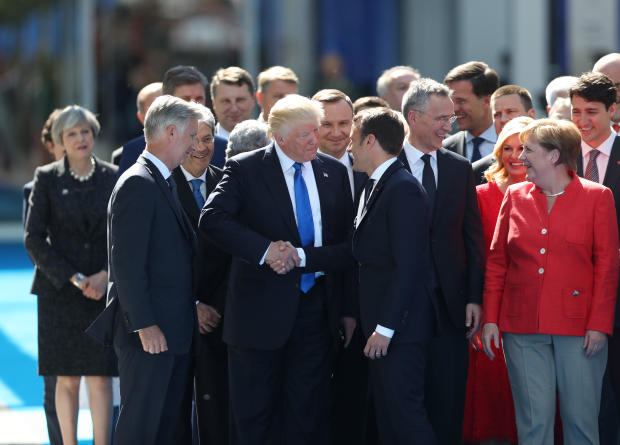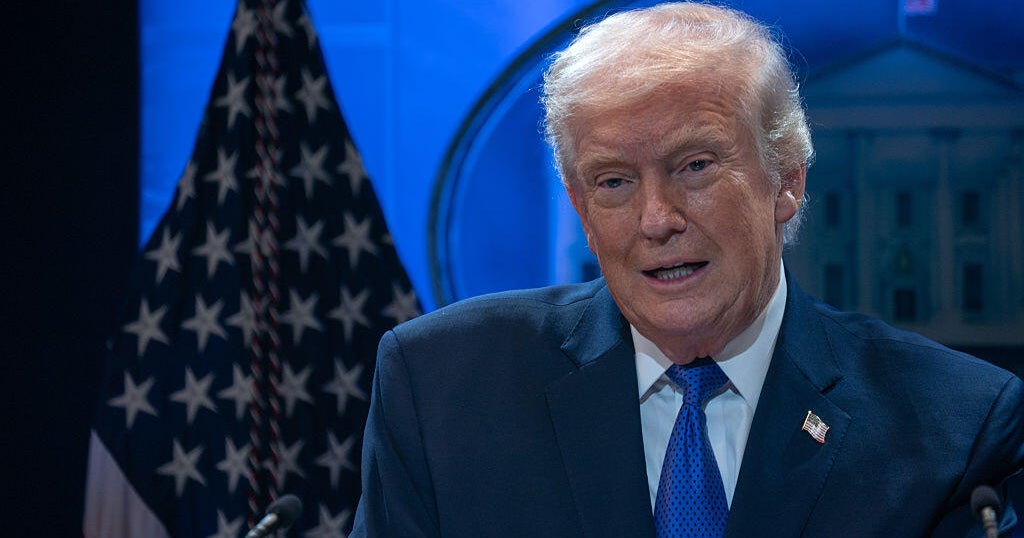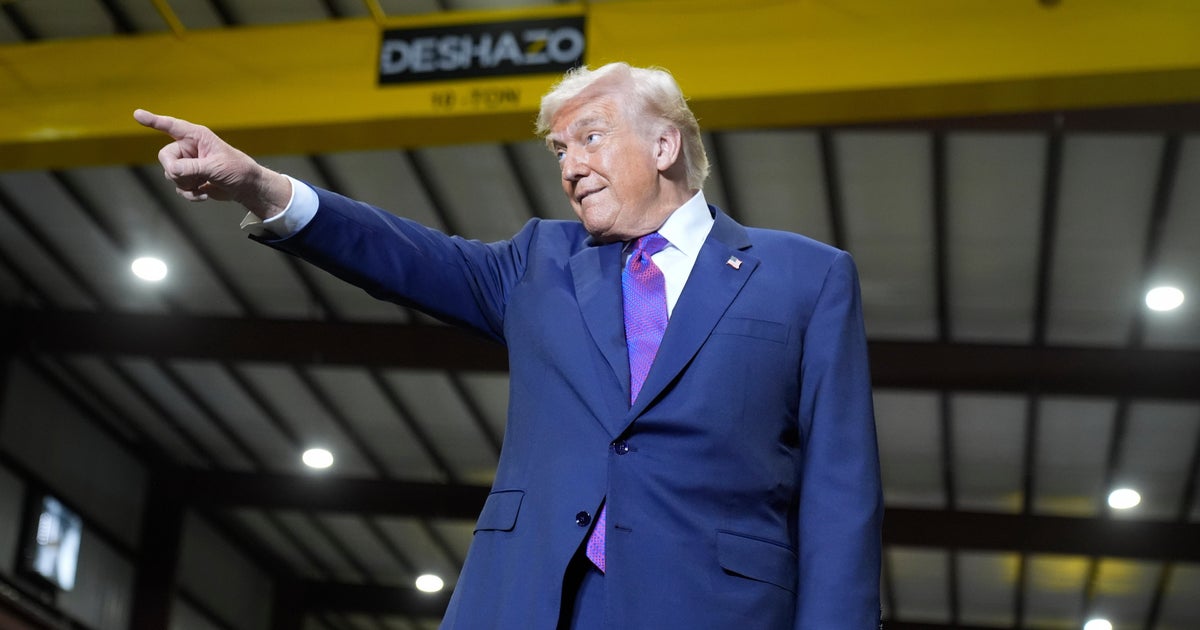NATO allies brace for possible Trump 2024 victory
London — With six months to go until the presidential election, America's NATO allies are planning to boost their defense spending ahead of the potential disruption of a second Donald Trump presidency.
NATO Secretary General Jens Stoltenberg is preparing a funding plan to try to insulate the 75-year-old military partnership from any changing political realities that might affect the alliance, according to Oana Lungescu, who until last year was the longtime lead NATO spokesperson for Stoltenberg.
"It is important to have predictability both for allies and for Ukraine," Lungescu told CBS News. "This [plan] relieves the U.S. of some of its organizational burden while still maintaining full oversight," she said.
Stoltenberg has proposed a $107 billion, five-year package of military aid for Ukraine that would give the broader alliance a more direct role in funding, Reuters reported last month.
Under the plan, European allies would create a shared Ukraine aid fund and increase their contributions to Kyiv's war effort, reducing the sizable funding provided by the U.S.
Trump's first term as president demonstrated that the 2024 presumptive Republican nominee is unafraid to upend the NATO alliance. Trump shocked America's allies with his open criticism of the failure of some NATO members to meet defense funding commitments, and the Trump campaign has said that calling on allies to increase their defense spending is a policy that a future Trump White House would aggressively pursue.
In an emailed statement, Trump campaign national press secretary Karoline Leavitt said that "President Trump got our allies to increase their NATO spending by demanding they pay up, but Crooked Joe Biden went back to letting them take advantage of the American taxpayer."
"When President Trump returns to the Oval Office, he will restore peace and rebuild American strength and deterrence on the world stage," Leavitt said.
Lungescu said that the strategy proposed by Stoltenberg would address Trump's complaint that NATO allies aren't doing enough to share the economic burden. At the same time, Stoltenberg is trying to protect Ukraine from the kind of severe delays in Congress — mostly driven by House Republicans — that halted U.S. aid and weapons funding for the first half of the year. NATO allies are also increasing their own individual defense spending, Lungescu told CBS News, although she also pointed out that American presidents dating back to Eisenhower have criticized NATO partners for not contributing enough.
NATO guidelines say member states should commit a minimum of 2% of their Gross Domestic Product (GDP) to defense spending to continue to ensure the Alliance's military readiness.
By NATO's own admission, in terms of GDP, the wealth of its members "nearly equals that of the U.S." But "non-U.S. Allies together spend less than half of what the United States spends on defense," according to NATO's website.
As of 2023, only 10 of the 30 other NATO allies had met the 2% spending commitment, excluding the U.S., though two-thirds of the NATO allies are expected to meet the target by the end of the year.
"I think by the time we get to the Washington NATO summit in July, we will have updated figures and will be in an even better position in terms of significantly increased defense spending," Lungescu predicted.
Trump vows to not protect NATO allies who don't raise their spending
In February, former President Trump said at a campaign rally in South Carolina that he'd encourage Russia to "do whatever the hell they want" to NATO allies who don't pay their fair share into the Western military alliance.
Referring to a conversation with an unnamed leader of an NATO country who asked him, "If we don't pay, are you still going to protect us," Trump said he replied, "Absolutely not."
Since Trump left office in Jan. 2021, his former national security adviser, John Bolton, has said the former president had been close to withdrawing the U.S.from NATO at the end of a 2018 summit and said another Trump term presents an existential threat to the trans-Atlantic alliance.
"Many [NATO] countries owe us a tremendous amount of money… The United States has paid and stepped up like nobody," Trump said at a July 2018 NATO gathering, adding that "something has to be done."
Will Trump withdraw U.S. from NATO?
"I think Trump will cause significant damage in a second term, damage that in some cases will be irreparable," Bolton wrote in his 2020 memoir, "The Room Where It Happened." He said he believes Trump intends to pull America out of the alliance if reelected.
"I think he fully intends to do that," Bolton wrote. "I think that would be a catastrophic decision for America and a whole host of other things. It's a very grim prospect to see Trump in for a second term."
"I think that actually the biggest danger he [Trump] is for NATO is his unpredictability," Ben Hodges, a former commanding general of the U.S. Army in Europe, told CBS News. "The urgency of defense investment is even greater if Trump turns out to be not as dependable as every other American president has been."
Hodges said that a way to ensure that NATO allies maintain smooth diplomatic relations with any incoming Trump administration would be for America's allies to honor their commitments and increase their defense spending now.
But he's skeptical that Mr. Trump would move to withdraw the U.S. from NATO, pointing to a law passed in Congress last year that prohibits the president from withdrawing from NATO or using any appropriated funds for that purpose without approval from lawmakers.
War game simulates NATO collapse in a second Trump term
A recent war game run by Finley Grimble, a former intelligence analyst for the U.K. Ministry of Defense, found that in the event of a second Trump presidency, the alliance would be vulnerable to collapse, even if the U.S. doesn't withdraw from NATO.
Grimble's war game ran a scenario in which Trump wins the election. The new administration immediately attempts to unilaterally broker a peace deal between Ukraine and Russia. The talks break down and Trump then slashes foreign aid to Ukraine.
In the absence of having the congressional majority needed to formally withdraw the U.S. from the NATO treaty, the Trump White House then significantly reduces U.S. participation in NATO exercises, including moving 50% of America's military presence in Europe, to the Indo-Pacific region.
Grimble told CBS News that his analysis showed such a scenario would leave NATO a "hollowed out, unprepared shell" by pursuing a policy of NATO "dormancy."
In Grimble's war game, Trump takes advantage of NATO's command structure in which the supreme allied commander of NATO forces in Europe is always a U.S. officer and is responsible for the overall command of NATO military operations.
"NATO has these war-fighting plans that are ready to roll out… but the supreme allied commander in Europe would answer to Donald Trump," Grimble told CBS News.
"You tell [the NATO supreme allied commander] to stop cooperating, to stop enacting the plans, and the whole thing falls apart. And that's what Trump did in the game," he said.





